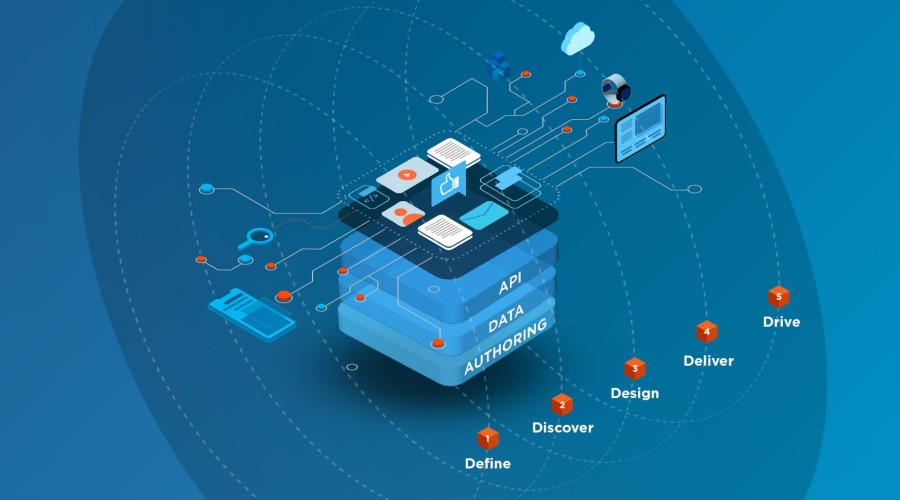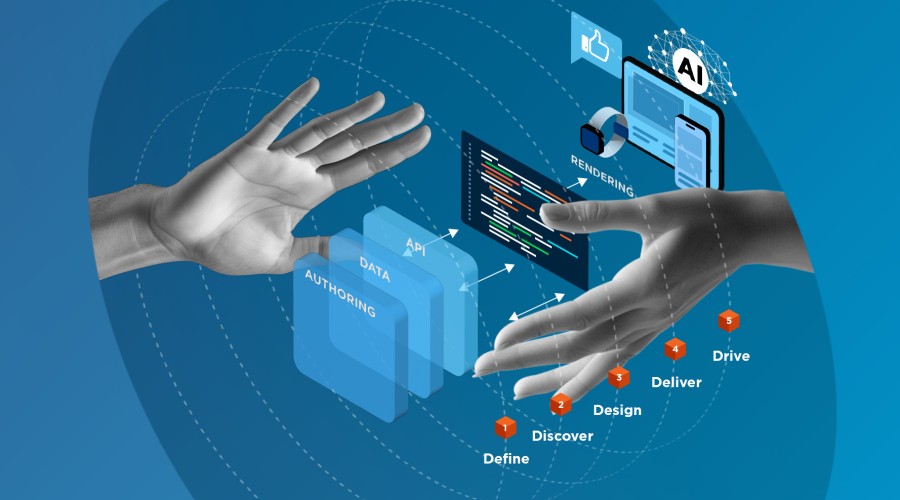We’re often asked why Drupal is better than other frameworks for building content management systems (CMS). The truth is, there are many other great CMS options out there. But in our experience, Drupal is an ideal enterprise solution.
We’ve worked with Sitecore, Silverstripe, WordPress and other well-respected traditional CMS platforms. Drupal offers many fantastic benefits: as an enterprise-level CMS framework, it can be used to create highly customisable CMSs, which can then be used to deliver flexible, highly scalable, multi-language websites and allow for efficient, advanced content management. We think this makes it an ideal enterprise CMS solution for companies that want to grow, evolve and expand their online platforms.
From a top-line perspective, some of the most notable benefits of Drupal are:
1. Customisable for bespoke websites
While Drupal is intentionally lean out of the box, it has thousands of open-source add-ons, enabling the creation of completely bespoke, powerful content solutions. If there isn’t an existing module for what you need, then your Drupal developers can build a custom module from scratch. Drupal offers the opportunity to personalise and style your web pages in countless different ways. From branding and UI, to security, to full eCommerce solutions, Drupal allows you to tailor your platform to suit your unique business and user requirements. Its versatility can be seen in action on the very different Drupal websites of major brands including NASA, The Economist, Tesla and The Grammys.
2. Quickly evolving through open-source community
As an open-source platform, Drupal has a huge community of developers and users, offering invaluable knowledge, useful resources, amazing innovation, and many opportunities for collaboration and joint problem-solving. It’s more agile too – the community isn’t beholden to a big organisation to respond to its concerns, so Drupal can evolve at speed.
3. Set up for integration
We’ve integrated many CRM and third-party tools with Drupal, and provided API-driven “content as a service” and APIs to third parties, working at speed to deliver timely solutions to our clients.
4. User-friendly for both end users and internal teams
Drupal offers fast, simple editing with flexible layouts, media management, revision tracking and content moderation and workflows. It offers an intuitive, efficient user experience with excellent governance. Once your CMS is set up and customised to your needs, your content team will be able to edit and add new landing pages with ease, so you don’t need complex development work every time a content update is due.
5. Scalable for the future
Most of all, Drupal is a CMS that’s scalable and flexible enough to cope with the demands of large organisations with complex requirements. Because of its ease with integrations and its vast modular capabilities, not to mention its in-built 100-plus languages, it can grow with you. And because it’s API-based, it has the flexibility to run headless, power apps, IoT devices and other bespoke digital products – all from the same foundation.
Should I use Drupal over WordPress?
It’s really not a question of one being better than the other, as WordPress is a truly great publishing platform for smaller or beginner sites. Instead, it’s rather a question of what you need a CMS to do for your business. With Wordpress, it’s easy to get started, and the editor interface is simple. Like Drupal, WordPress has tools for multichannel publishing, SEO, digital asset management and ecommerce functionality. It’s also particularly strong in providing thousands of reliable content management features, visual themes and easy-to-use block editors. It’s a great choice for businesses looking to set up a website quickly with no experience required.
By contrast, Drupal has more of a steep learning curve, but is a more customisable and scalable CMS solution. Drupal is ideal for businesses with technical skills in-house, or access to developers who can write the required custom code, get the site up and running and oversee updates. The good news is that once you have a Drupal CMS, you won’t need developer time every time you want to create or update a new page or block. This can be done easily by marketers and content teams within the guardrails of the site created by your developers.
If you’re looking for an enterprise content management solution that’s capable of dealing with organisational, operational and content complexity, we believe Drupal is a much better bet. WordPress is popular precisely of its fantastic simplicity – it’s ideal for smaller, less complex sites. However, you may run into performance issues if your site has a lot of content, and is likely not to scale well to scenarios such as Internet of Things, AI and other advances in digital.
Drupal will set your site up so it’s able to grow and evolve as your business progresses, enabling you to keep up with your KPIs. With endless scope for bespoke modules and styling, it’s also the best choice for creating a unique platform that's exactly suited for the needs of your business and users.
Is Drupal a good choice for my CMS?
We believe Drupal is a brilliant, versatile content management platform that’s flexible enough to fulfil many different needs for all kinds of scenarios, from small, simple websites and mobile apps to large enterprises and complex technical integrations, such as ecommerce stores. As we mentioned earlier, it’s open source, highly customisable, has strong security, and a supportive community of Drupal developers. But most of all, it offers amazing scalability.
Drupal is built to handle large volumes of content, power apps and integrate with external APIs. It gives you a strong, user-friendly base framework to build from. Once your CMS is set up, web content management becomes easy. Bespoke pages can be created by non-developers with a user-friendly page builder; they can simply use predefined blocks or drag and drop custom blocks into a page. You don’t have to reinvent the wheel each time a page update is required. That gives you huge advantages when it comes to time, flexibility and functionality.
Security is another one of Drupal’s strongest points of differentiation, with strong user management and password encryption straight out of the box. You will have the opportunity to strengthen security even further by adding modules for features like IP restrictions, selective access controls and restrictions, and multi-factor authentication.
The accessibility of your site ultimately depends on how it is designed and themed; once the CMS is in use, content editors also have a responsibility to enter, edit and manage the content correctly to ensure the website stays accessible and inclusive. However, Drupal does provide an excellent basis for creating inclusive and user-friendly platforms. As a platform, Drupal is committed to accessibility; all features of Drupal core must meet WCAG 2.1 AA and ATAG 2.0 guidelines. The Drupal community actively works to resolve accessibility issues in the development process and is a great resource for support and documentation if you’re looking to improve the accessibility of your site.
Drupal is particularly suitable for:
- Content-heavy websites
- Learning environments
- Sites with membership or paywalled areas
- Sites with personalisation and automation
- Mobile sites and apps
- Internet of Things integrations
If your organisation is growing, you’re looking to move functionality online, or you think you may want to integrate with other services or data in the future, then Drupal could be the perfect choice for you. It can easily handle new features, integrations or growth in functionality, so you’ll be well-prepared for the future. Drupal can also be decoupled from the front end, making it a good choice for organisations in need of headless CMS platforms.
You will need to consider that there’s a learning curve with Drupal: if you choose it as your content management system framework, you will need dedicated developer time to get you started or help along the way – but you’ll be left with a fully customised site built on a framework that can evolve and grow along with your organisation’s needs, so we believe it’s definitely time well spent.
I’ve decided Drupal is the right choice for me. How does the process work?
Each Drupal site is unique – that’s part of its strength – but generally, if you’re building a Drupal site you’ll undergo four main stages: user research, planning, implementation and review. At times, these stages will often run in parallel with each other.
If you’d like to understand how an enterprise level Drupal implementation might work for you, get in touch – we’d be happy to chat through your needs. You can read more about what’s involved in Drupal site creation in our article, What is Drupal? A 101 Explainer.
Helping you make the right decision
We’ve been developing with Drupal since 2005, since the days of Drupal 4 and now are developing in its latest version, Drupal 10.
Our expert team of Drupal developers – many of whom have more than a decade of hands-on experience with Drupal – have been trusted by clients including The College of Policing, The Commonwealth and Sport England. We’re here to help with your sites, too. If you’d like to explore how Drupal could help your organisation, or discuss anything to do with enterprise CMS platforms for your organisation, get in touch – we’re here to help.
Read the next blog in this series:




